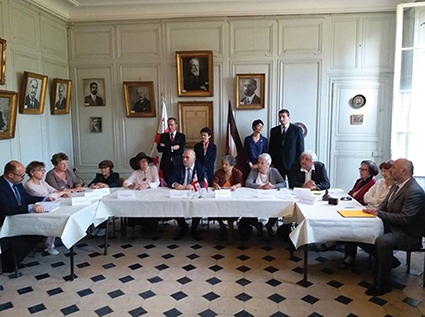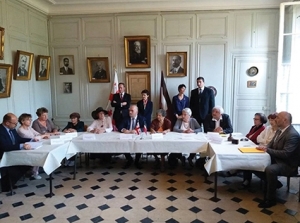99! Transfer of the Domain of Leuville to the Georgian Nation, Sept. 2016
Ninety-nine years today! Yes, almost a century since my father Noe Jordania proclaimed Georgian independence on May 26, 1918. Hardly anyone remains who was alive at that time, and definitely no-one who would remember anything. My sister Nathela, who was born in Tbilisi in November 1918, passed away last year – she was 98 years old. Claude de Kemoularia and Zeinab Zourabichvili-Kedia the last of my contemporaries, also sadly passed last year. At the age 95, I am the only one remaining of the immediate descendents of the great men and women who created our first republic, born in Paris the same year our country was invaded by the Soviet Red Army, at which time the Georgian Government went into exile to continue the struggle for freedom, as directed by the Georgian parliament.
It has been some 26 years since Georgia shook off the soviet yoke, and once again gained its independent, and restored May 26 as our national day of independence. But for me and all older Georgians in exile during the 70 years of soviet occupation, it has been almost a century.
When I was growing up in Paris in the 1930’s, May 26 was the most important day of the year, for me and my young Georgian friends. That was the day when all exiled Georgians, regardless of party, religion, sex or opinion would come together in celebration, sorrow, and remembrance. Even at such a tender age, I remember it as a solemn occasion, with our revered flag – the three-colored one – in a prominent position together with our elegant coat of arms, unencumbered by gratuitous elements. Of course, we all sang with fervor our national anthem, Dideba, with its Georgian sounding harmonies.
That tradition went on during seemingly never ending years of Soviet occupation. Then, in 1990, the first year I could come to Georgia, I had the joy of seeing our three-colored flag, symbol, and national anthem ‘Dideba’ revived, with our flag hoisted on all public buildings, displacing the hated Soviet one. Eventually, Georgian politicians decided to replace our flag with the Bagration medieval banner, with its connotations excluding anyone who is not a practicing orthodox, the old anthem with Paliashvili's music and its Italianate melodies and harmonies, and burdening our clean-cut coat of arms depicting St George riding the skies over Mount Elbrous with pretentious symbolism. At least our national independence day remained the same, affirming continuation of present day Georgia with the 1918-21 republic.
After almost a century there are no living persons with direct memories of those times. However, there is no lack of documents, texts, photographs, and movie newsreels. There is a renewal of interest and research on the period, particularly amongst the new generation of young historians untainted by negative Soviet propaganda. Yet, to convey the direct interpretation of actually having lived in that given time there is nothing better than a novelist's interpretation.
Tbilisi in the Times of Noe Jordania
The Civil War, a conflagration extending over thousands of miles, had cut Tiflis off from Moscow completely. An independent republic had sprung up in Georgia, led by the Liberal Menshevik Noe Jordania. Iniquity raged everywhere, famine and pestilence reigned, but on the other side of the peaks of the Caucasus free Georgians, together with Armenians, Persians, Russians, Greeks, and Jews, sat beneath chestnut trees, drinking wine and Lagidze mint and eating fresh lavash bread, radishes, herbs, shashlik that wasn’t bad for the times, and, as always, the exceptional satsivi chicken with nuts, lobio beans and tskhinvali fish.
Tiflis had witnessed an amazing flowering of artistic life. Even as war was raging on the Western front, poets and artists were racing south in order to avoid the call-up, and later they became fleeing the Reds, the Whites, the Greens... in short, anyone who did not understand that only a revolution in art would save the world, not banal artillery, not vulgar sabers, and not those supremely indecent mass killers with machine guns.
Small theaters and bohemian cafes opened all over the place. The Futurist poet Vasily Kamensky read his epic Stenka Razin from a white horse galloping around a circus ring. Sergei Gorodetsky lightheartedly made fun of the Provisional Government in his Symbolist journal. Noe Jordania was depicted on the cover of one issue as a loathsome, distrusting goat. In reply to this mockery, the Premier smiled and said, "They’re poets!"
Titzian Tabidze, a member of a group of poets called the Blue Horns, ran into to the mayor of Tiflis one day on Golovin Prospekt. ’ “Listen, Titzian, why do you walk around my city with your young wife looking so down?” asked the mayor. "We have nowhere to live, Mr. Mayor," complained Titzian. "We have no money to pay for a flat."
The mayor took a key from his pocket. “Titzian, I’ve just requisitioned the mansion of the Businessmen’s Club. Go and live there with your young wife, work there. Only don’t deprive Georgia of your verse."
Everything was so wonderful in Tiflis during that three-year springtime. Noah’s ark Jordania floated like a prospering block of ice in a sea of blood and muck, in the sea of the typhus epidemic of the Civil War, and looked as though it might sink or split at any minute; maybe it was wonderful precisely because it was so fragile; all that were present felt as though their heads were spinning…
By the end of 1920, all such liberty that had been so greatly received in the South had vanished, perhaps flown back to its sources, to the Greek islands. The Georgian Republic was in its death throes. In 1921 the Red Army burst in and freedom came to an end. (From: Generations of Winter by Vassyil Aksyonov)
Yes, freedom came to an end; our republic was forcibly incorporated in the Soviet empire, but it continued to be internationally recognized for several years, never ceased to exist in the minds of all of us living abroad, and materialized in the Domain of Leuville near Paris, dubbed Little Georgia, which was acquired in 1925 by the government in exile on behalf of all Georgians.
Last year, some 90 years later, the wish of my father and his associates that some day the property would be incorporated in a free and independent Georgia finally came to pass: on September 23, 2016, the custodians of the Domain of Leuville, who had jealously preserved it for almost a century, solemnly transmitted full possession and responsibility to our country. As specified and legally binding in the transfer document, work will soon be underway for the rehabilitation and modernization of the property and its perpetuation as a museum of our First Republic and a Franco-Georgian cultural center.
All Georgians, whatever their political inclination, should be proud that Georgia was the first social-democratic country in the world. Now that it is an integral part of our nation, the domain of Leuville will always remain in our hearts an essential phase of our national evolution.
Gaumardjos Sakartvelos (Cheers to Georgia)
Redjeb Jordania, New York, May 18 2017
Life in Leuville before the second world war:
The Colonel
Colonel Tsereteli was a retired Georgian officer whose occupation consisted entirely of serving as Tamada — toast-master — during the numerous keipis (banquets) that took place, lasting often from afternoon until the following dawn. Enormous quantities of red wine were consumed, Colonel Tsereteli breaking all records, as was only proper for a successful Tamada. And with that, he never got drunk.
How many Keipi were held there over the years! The great table or tables around which thirty or more guests could be seated always looked immaculate since tablecloths were disposed of. Despite less than ideal conditions, these Keipis gave birth to enormous quantities of lobio, satsivi, kharcho, romi and other traditional Georgian dishes.
Guests came from Paris, some twenty kilometers away, and they brought the food and drink, since the colonel didn’t have a penny. What he had, and what no amount of money could buy, was hospitality, camaraderie and such a big and generous heart that to be near him, even without speaking to him, one would feel enveloped by his warmth. It was undoubtedly for that reason that the banquets were held at his place. Often they would last from Friday to Monday! The guests would come and go, but the colonel remained there, in his role as Tamada, a role that he filled with brilliance and dignity.
One day the colonel got sick, for the first time in his life. A doctor came, and since I happened to be there, I served as interpreter. The colonel was 82 years old at that time, and although he had been in France for thirty years, he could not speak one word of French.
The doctor: Ask him if he drinks a lot.
Me: Colonel, the doctor wants to know if you drink a lot.
The Colonel: Drink? Alcohol? No, I don’t drink. I only drink red wine.
The doctor: Well, how much does he drink?
The Colonel: Oh, I drink a bit here and there, normally.
The doctor: But what does he mean, normally? One bottle per day? Three? five?
The Colonel: (indignant) What? Five bottles? What does he take me for, a child?
After some more back and forth, the Colonel admitted that now that he was getting on in years, he only drank about eight bottles daily. Hiding his surprise, the doctor prescribed him to limit himself to four bottles. “If I restrict him to any less than that, he will die, his metabolism is so accustomed to wine!”
Excerpted from Redjeb's book of memoirs ALL MY GEORGIAS. Can be downloaded FREE in most formats from: https://www.smashwords.com/books/view/125916. Also available as a paperback from Amazon.com
Nicole and Noe Jordania











